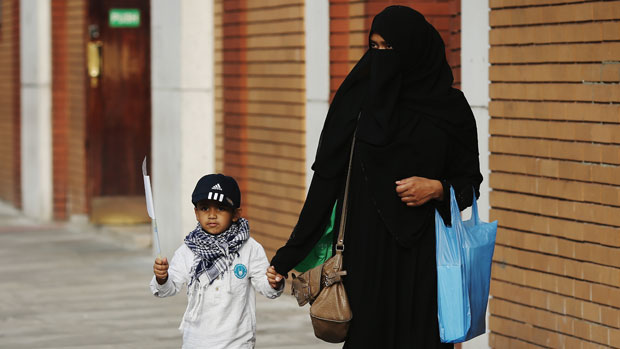'Ban the burka': why is the veil so divisive?
Rightwingers and feminists are united against the burka, but their opponents say a ban would be un-British

A free daily email with the biggest news stories of the day – and the best features from TheWeek.com
You are now subscribed
Your newsletter sign-up was successful
The European Court of Human Rights has upheld France's ban on wearing a burka in public, reigniting the debate on Islamic dress with a ruling described by human rights groups as setting a 'dangerous precedent'.
Surveys show that the majority of British people would support a ban on the full face veil worn by some Muslim women in the UK.
Why is Islamic dress such a divisive issue in the UK and how has the debate been seized on by an "unlikely alliance of rightwing politicians and feminists"?
The Week
Escape your echo chamber. Get the facts behind the news, plus analysis from multiple perspectives.

Sign up for The Week's Free Newsletters
From our morning news briefing to a weekly Good News Newsletter, get the best of The Week delivered directly to your inbox.
From our morning news briefing to a weekly Good News Newsletter, get the best of The Week delivered directly to your inbox.
The veil is 'oppressive':
The most common argument advanced by feminists in favour of a ban is that the veil is a form of patriarchal oppression. "Women should be clear that the burka is a symbol of oppression and segregation," Conservative MP Sarah Wollaston told The Guardian.
Wearing a veil implies that "women are dangerous to men and society and must be covered and that's what we cannot accept", says author Yasmin Alibhai-Brown, who is a Muslim.
But many Muslim women and campaigners argue that for a lot of women, wearing the veil is a personal choice and it is 'offensive and patronising' to believe that all Muslim women lack the ability to make that decision.
A free daily email with the biggest news stories of the day – and the best features from TheWeek.com
"It's as if the female, as an adult individual, is obviously ill-equipped to make such decisions on her own," says columnist Faraz Talat. Theresa May, the Home Secretary, has also said that Muslim women must be "free to make that choice".
It is 'anti-social':
Many anti-burka campaigners argue that the veil serves as a barrier between women and society, preventing open social interaction. People report feeling "uneasy" and "uncomfortable" around Muslim women who choose to cover their face.
These "bin-bags", says Telegraph journalist Allison Pearson, "prevent women from playing a full part in society."
A ban would be 'Islamophobic'
Opponents of a ban claim that the controversy surrounding the veil is based on prejudice and anti-Muslim feeling. A burka ban is a "flagrant exhibition of institutional bigotry", said Talat.
A recent report by Amnesty International accused European governments of "pandering to prejudice" by supporting bans which would no nothing but promote violence, fear and hatred.
Marco Perolini, Amnesty's expert on discrimination, said: "There is a groundswell of opinion in many European countries that Islam is alright and Muslims are ok so long as they are not too visible."
A ban would be 'un-British'
When questioned on the issue, Nick Clegg said imposing a ban would be "un-British" as it goes against values of liberty. Campaigners argue that it would be unacceptable to have "the government policing your wardrobe".
Allowing people to wear what they want was the very "basis of a free society", Baroness Warsi, Britain;s minister for faith and communities, told the Telegraph.
-
 What to know before filing your own taxes for the first time
What to know before filing your own taxes for the first timethe explainer Tackle this financial milestone with confidence
-
 The biggest box office flops of the 21st century
The biggest box office flops of the 21st centuryin depth Unnecessary remakes and turgid, expensive CGI-fests highlight this list of these most notorious box-office losers
-
 What are the best investments for beginners?
What are the best investments for beginners?The Explainer Stocks and ETFs and bonds, oh my
-
 How corrupt is the UK?
How corrupt is the UK?The Explainer Decline in standards ‘risks becoming a defining feature of our political culture’ as Britain falls to lowest ever score on global index
-
 The high street: Britain’s next political battleground?
The high street: Britain’s next political battleground?In the Spotlight Mass closure of shops and influx of organised crime are fuelling voter anger, and offer an opening for Reform UK
-
 Is a Reform-Tory pact becoming more likely?
Is a Reform-Tory pact becoming more likely?Today’s Big Question Nigel Farage’s party is ahead in the polls but still falls well short of a Commons majority, while Conservatives are still losing MPs to Reform
-
 Taking the low road: why the SNP is still standing strong
Taking the low road: why the SNP is still standing strongTalking Point Party is on track for a fifth consecutive victory in May’s Holyrood election, despite controversies and plummeting support
-
 What difference will the 'historic' UK-Germany treaty make?
What difference will the 'historic' UK-Germany treaty make?Today's Big Question Europe's two biggest economies sign first treaty since WWII, underscoring 'triangle alliance' with France amid growing Russian threat and US distance
-
 Is the G7 still relevant?
Is the G7 still relevant?Talking Point Donald Trump's early departure cast a shadow over this week's meeting of the world's major democracies
-
 Angela Rayner: Labour's next leader?
Angela Rayner: Labour's next leader?Today's Big Question A leaked memo has sparked speculation that the deputy PM is positioning herself as the left-of-centre alternative to Keir Starmer
-
 Is Starmer's plan to send migrants overseas Rwanda 2.0?
Is Starmer's plan to send migrants overseas Rwanda 2.0?Today's Big Question Failed asylum seekers could be removed to Balkan nations under new government plans